Hello! Apologies for the delayed absence! I spent all winter coordinating my kid’s school auction…listen, I have a veterinary degree but planning a massive school fundraiser is a ridiculous test of patience and organization. Tip of the hat to all the PTA parents out there.

Halfway during the auction planning process I began to refer to my voluntary, self-induced torture as “The Idiot Hut,” as coined by my favorite Oxford academic-turned-time traveler.
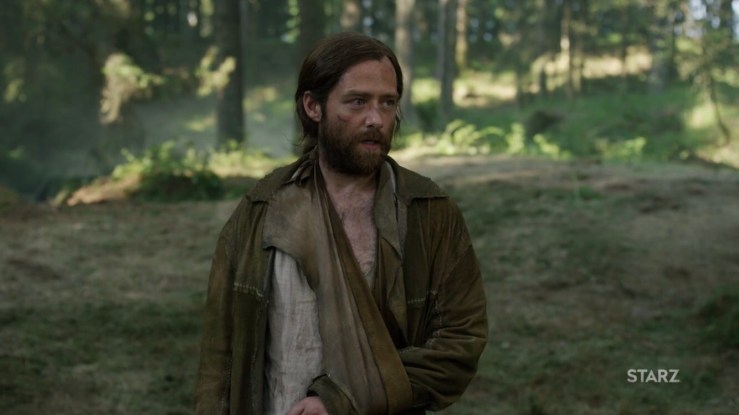
Yep, that one. And my wheels about Roger have been turning for quite some time– both during the majority of Season 4 and in the post-season. Because of all the characters I expected to cause controversy this season, this guy was near the bottom of my list.

So how did we get here? How did critics and the fandom end up debating one of the most endearing and relatable characters from the entire canon? Roger is supposed to be a slam-dunk in terms of character likability, but somehow we went from affability and lobster rolls to accusations of misogyny. What happened?

While I’ve previously gone on record defending Season 4 (I actually enjoyed it quite a bit), I will offer one criticism: Roger, as we know and were expecting him, was somewhat misrepresented.
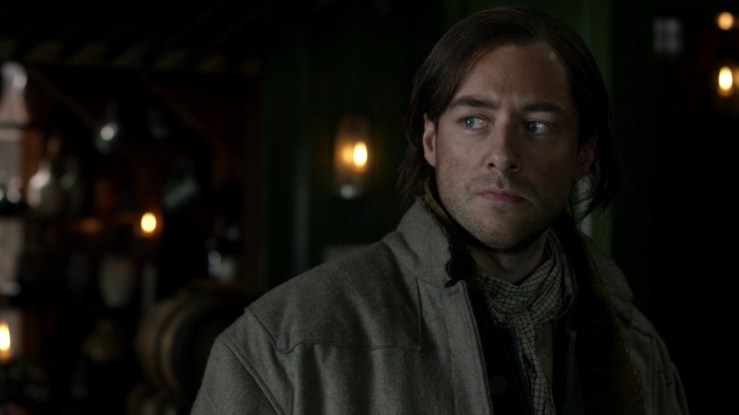
Not misrepresented by Richard Rankin, who is exemplary. Not even totally misrepresented in terms of physical looks and costuming; although I always imagined Roger looking like Prince Eric from The Little Mermaid (who we all know is the most handsome Disney prince ever)…

…and Richard Rankin comes amazingly close…

…I’m willing to overlook the beanie and many, many layers because I can see what was achieved in witnessing Roger’s physical transformation from start…

…to finish:

Rather, there were missteps in the adaptation process that somehow left many viewers wondering what, exactly, does Brianna see in this dude? After two major fights back to back, following Brianna to the eighteenth century despite her wishes not to, and keeping important information to himself, viewers were forced to make some fairly large mental leaps to believe that these two will have a happily ever after.
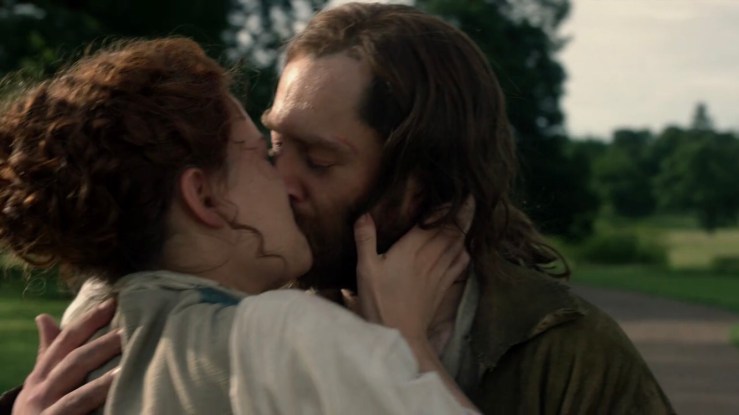
So I’m about the lay out the case for Roger, because if we want to continue to be invested in this show and its future seasons, it behooves the fans to actually really like him. He’s the second leading man of the series, the husband to Jamie and Claire’s daughter, and the father to their grandchild. He’s important and we should be invested in his story. And, because of that, I’m going to suggest that going into Season 5 people should consider reading (or re-reading) the books.

I readily admit it’s difficult to be a book reader and not bring pre-conceived biases about the plot, characters, or story direction into the television series. I try very hard to separate the novels from the show because I think both are excellent in their own right and I respect the creative processes of two very different media. Additionally, I don’t think reading the novels is necessarily a prerequisite for watching the show; the show should be able to stand alone without relying on the novels to fill in story or character development.

That said, the novels help support much of Roger and Brianna’s story that was somehow altered or omitted in Season 4, and so much of the controversy surrounding Roger in recent months is explained in the length, dialogue, and context provided in Drums of Autumn.

Take, for example, Roger’s inner monologue surrounding his and Brianna’s engagement fight, most of which is lost when we jump from novel to screen:
“He felt suddenly afraid, not to himself but for her; as though something might materialize from [the loch] world to snatch her back, away from him. He grasped her by the hand, as if to prevent her. Her fingers were cold and damp, a shock against the warmth of his palm.”
and:
“It was a great effort to turn and face her; he had no wish for empty comfort, no desire to hear a feeble offer to ‘be friends.’ He didn’t think he could bear even to look at her, so crushing was his sense of loss. But he turned nonetheless and then she was against him, her hands cold on his ears as she gripped his head and pushed her mouth hard onto his, not so much a kiss as blind frenzy, awkward with desperation.”

Richard Rankin did a beautiful job in this scene, as did Sophie Skelton. The anger, pain, and rejection were obvious for both their characters. But what cannot be translated is the empathy of those crushing emotions when we actually read them.

Revisiting and exploring this scene in the novel a bit more, we can understand how much of it was changed for the show. Brianna, being much taller and physically forceful in the novels, actually bites Roger. The absence of her physical roughness therefore changes the dynamics of their dialogue. Additionally, the scene in the novel takes place immediately following Mass, providing a different context for the “nice Catholic girl” comment. It’s not totally forgivable from our modern perspective but it adopts a bit more irony than when it’s said at the Scottish festival. Also consider an alternate scenario, in which it is Brianna who is insists on marriage before sex and Roger is the one rejecting the proposal…would we view it differently?
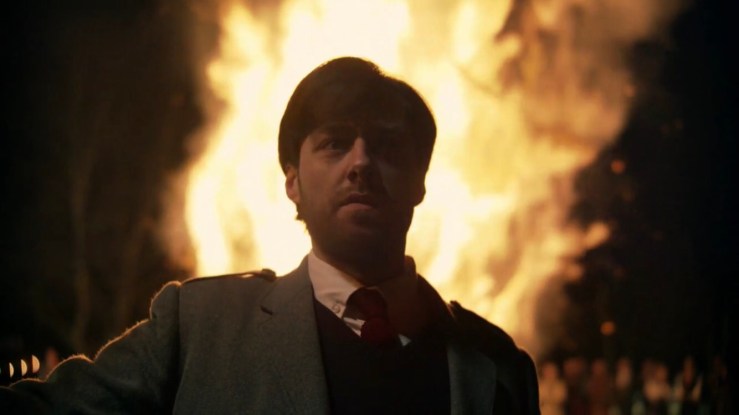
Most importantly, in the novel Brianna and Roger end this scene on sad but mostly okay terms:
“’It’s not only your body that I want—though God knows, I want it badly. But I’ll have you as my wife … or I will not have you. Your choice.’
She reached up and touched him, brushed the hair off his brow with fingers so cold, they burned like dry ice.
‘I understand,” she whispered.'”
Neither one is angry, only heartbroken. And so when Roger later decides to follow Brianna to the eighteenth century, it’s seen less as an apparent violation of boundaries and more as the necessary protection of someone he loves.
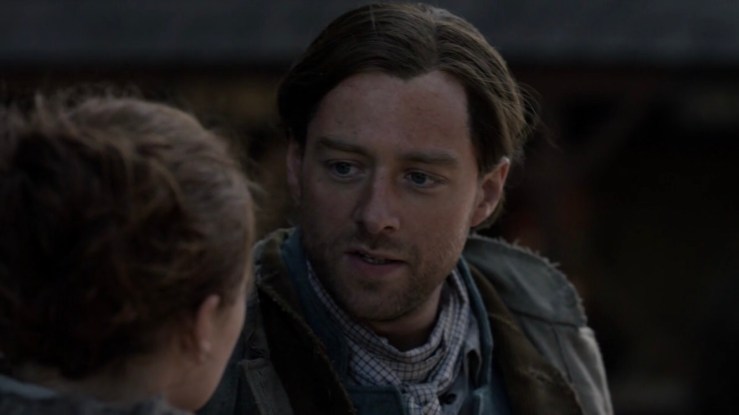
But beyond novel Roger versus television Roger, there is much to love about this character when we remember that he doesn’t merely exist in the vacuum of Season 4; he’s been present in every season, either in child or adult form. He plays a prominent role in most of the novels and some of the novellas. He’s been here the whole time, quietly helping advance the plot.
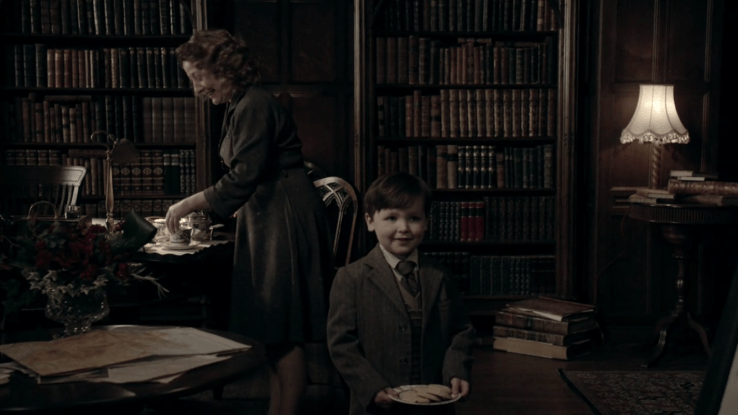
What we learn when we spend so much time with this character is that Roger is a man who often believes in things despite evidence that he should believe the opposite. Take, for instance, his willingness to believe in Claire’s story of time travel. He routinely chooses to believe the best in people. Some might call that faith.
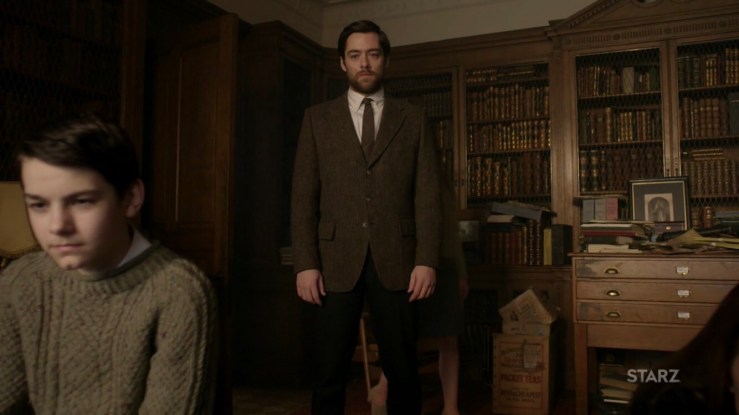
“Faith” is the perfect descriptor for Roger and is especially fitting for a man raised in a manse. Faith guides Roger’s thoughts and his actions are usually rooted in some good or moral intent. Providence” (Episode 412) explores that theme deeply; it was the closest we came this season to seeing the character many of us were expecting.

Roger is a self-described “dog with a bone” and, as such, he rarely gives up. He keeps searching for Jamie long after Claire and Brianna give up the literal ghost. He fights for his relationship with Brianna, seeing the foundation of love beneath the rubble of miscommunication. He sacrifices his freedom to help Alexandre, choosing to believe in a higher righteousness. He is a man who trusts in abstractions, and isn’t that just a different way of describing faith?

And think about how that investment guides his choices, both in what we already know of Roger and who we know he will become (no spoilers, please). As the son of a minister, his whole childhood was an assumption in the metaphysical and theological. As an adult, what is being a historian except studying events that (for the living) are fairly abstract? The same goes for musical emotion. The same can be said of love. Sometimes the most important things in our lives are the non-material.

How surreal it must be, then, for such a man to study the abstract and then face the tangible flip-side: the reality of heartache, the phenomenon of time-travel, the actuality of the eighteenth century. Of all the characters in the Outlander universe, he is perhaps the best-equipped emotionally and intellectually for such an adventure.
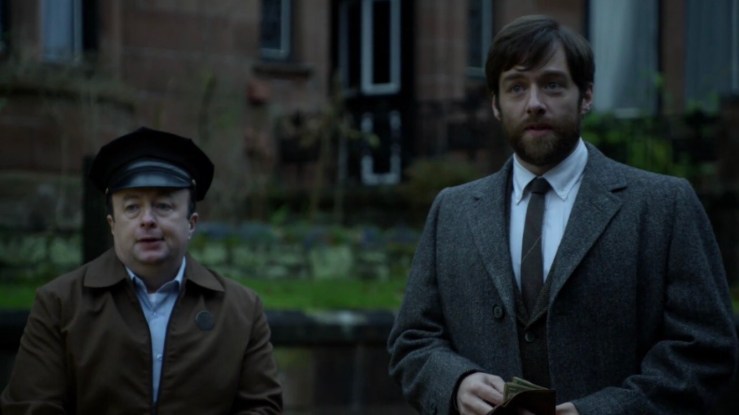
So let us embark on our next Outlander chapter as Roger would: with a leap of faith. He’s a character worth believing in; he rarely gives up and neither should we. Let us remember the biscuit-eating child, the academic who searches for lost loved ones, and the man who crossed two centuries in the name of love. From Drums of Autumn:
“It was a leap of faith—to throw one’s heart across a gulf, and trust another to catch it. His own was still in flight across the void, with no certainty of landing. But still in flight.”
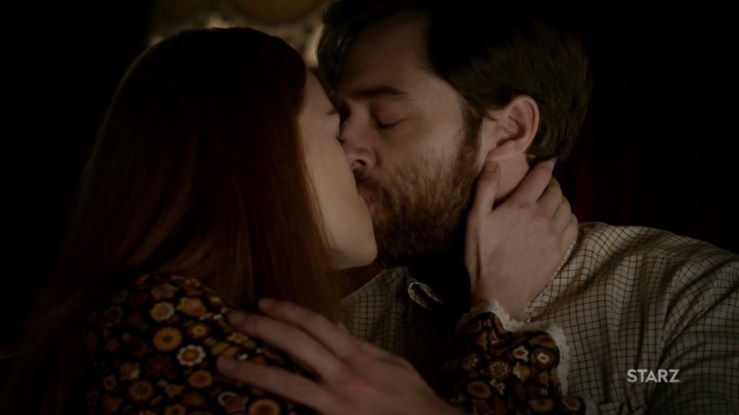
Slàinte.
photos: STARZ


Thank you for a wonderful article trying to accurately suss out what went wrong in how the audience viewed Roger in S4.
You said that you try to keep the books and the show separate from each other. Even though admitting that in S4 the show left out or omitted key details of Roger’s character in regards to his relationship with Bree. You gave great examples of what was sorely missing in Roger and Bree’s relationship by showing Roger’s thoughts in the book. Without those insights into his character it’s no wonder many of the viewing audience turned on him.
The scripts were severely lacking in putting Roger’s character across. One should not have to rely on the books to fill in vital missing details. It is the show’s job to get that across by whatever means necessary. The producers claim there isn’t time for such things yet they do not hesitate to add superfluous scenes (ie: Changing the circumstances of the trade of goods for Roger and creating false drama regarding the wearing of the opal by Claire.) They seemed to have all the time in the world for that.
My point is, yes, keep the books and the show apart and let them stand alone. That is the way it should be. But when production decides to cut key elements of a person’s character in order to save time, these types of situations will continue to occur causing confusion and dissent from the viewing audience. One should not have to fill in the blanks with the books in order to follow the story being told.
This is Outlander’s fourth season. As you pointed out, Roger has been there since the very beginning going from a wee child to an adult. His story is an integral part of the Outlander saga. You’d think the producers would have figured that out by now.
LikeLiked by 1 person
Thank you so much for this feedback. Yes, I totally agree— I generally view the show and novels separately and try not to make too many comparisons, but so much was lost with Roger and Brianna’s relationship.
LikeLiked by 1 person
This is a very interesting take on Roger in Season 4. No matter what, I still love the character, and I don’t think he was presented as badly as many viewers who are also book readers think. The crux of the matter is that the only way we get the thoughts of someone in a filmed presentation is through dialogue, either inserted into verbal exchanges or through voice overs. And the hard reality is that there really ISN’T time to portray every thought we’ve read that we’d want to see on the show.
I’ve read the books, so maybe I’m spoiled because I’ve read the passages you quote. But I’m a “contemporary” of Brianna (I was born in 1947), and the sort of exchange that went on between her and Roger in the motel is one I could actually see occurring in the early 70’s — especially when Roger’s background of being raised in a manse by a minister is considered, while Brianna, living in America and in a university milieu, was raised in a much more liberal way. He was in a different place than Brianna was, and I think he missed something very important in their discussion that was included in the dialogue: she told him she wasn’t ready for marriage yet. And truthfully, in the book and on the series, she wasn’t. In fact, I don’t think she was quite ready when she did agree to marry him!
Many of the complaints I’ve heard about Roger is that he should have come back from the Mohawk Village to Brianna immediately. In fact, he stayed away even longer in the books. The series, in very condensed bits of dialogue, showed he stayed away, not just because he had to decide whether he could be the husband Brianna needed, but if he should give up returning to their own time and continue to live in a century he wasn’t really equipped to live in. As Clare said to him, he needed to be sure he could do all that.
We’ll see how Roger is portrayed in the upcoming season. We can certainly agree on one thing: that we hope the scripts will make it much clearer what a good guy he is. He deserves it.
janet
LikeLiked by 2 people
I only read the first book before binge-watching prior to season four. I have always liked Roger and feel concerned when people grouse about him with a filter of 2018-2019. At most he is a product of cultural thought of the 1960’s and a very different time from current cultural thought. He always seems to have a moral compass to me and loves this edgy woman who drives me to distraction! I try to remember shes is a product of the female liberation of the 60’s, but sometimes she is just bratty! So far, not my fav character, but perhaps I beed to be more open-minded about her in season 5, or go read the books to help me like her more! I’m good with Roger.
LikeLiked by 1 person
I’m totally with you on Prince Eric. But, like you, I think Richard Rankin will more than do. Thank you for another great think piece. I didn’t love the past season, but I’m full of optimism for the next.
LikeLike
Thank you again for your thoughtful insight on the show and the books! I love Roger in both forms of story telling, the casting is perfect because his character is on a journey and we need to watch his transformation! Be patient fans! Perhaps I’m filling in characterization with what I know from the books subconsciously, I know I have been for Brianna but I now commend the casting, Roger has so much more to go through!
LikeLike
Agreed on Prince Eric! Though in my head I always imagined book Roger looking like Scott Foley
LikeLike
Thank you for taking up the Roger cause and for explaining to viewers what we readers have known all along. Roger is a symbol of quiet strength and love and faith. The show failed to present the inner Roger in season 4 and I hope they get it right in season 5. As for Prince Eric, nope. Best Disney Prince is Philip. Sorry. 🙂
LikeLike
As another Janet said earlier, I too was born in 1947, the year when Bree was born, and when I read many of the comments by people who felt Roger was misogynistic I thought they simply didn’t understand the difference in a minister’s son from Scotland and his upbringing versus a 1960s young woman influenced by Woodstock, the feminist movement, and the much freer social atmosphere in the US at that time. In addition, I think that the show writers are reluctant to work into the scripts some of the spiritual and religious background of all of the characters. Perhaps they think it will be controversial, that modern audiences will be put off by it. Or perhaps they simply don’t know how to write dialogue that might convey some of what is conveyed by the characters’ thoughts in Diana’s novels. Since that is an important part of Roger’s upbringing and his way of looking at the world it caused confusion about his motives when it wasn’t addressed.
LikeLike
Good points covered in the article. I also missed Roger’s interactions with Fiona in the beginning, learned a good bit about him there. I never thought like some that he stalked Brianna across the sea– rather, he was afraid of never seeing her again and wanted badly to protect her. Roger and Jamie also take time to form a relationship. I think they came to love with each other intensely in a bond of family, admiration and manly love.
LikeLike
[…] wrote a Season 4 post-mortem on Roger’s character last year, arguing that while I did actually enjoy Season 4 as a whole, the […]
LikeLike